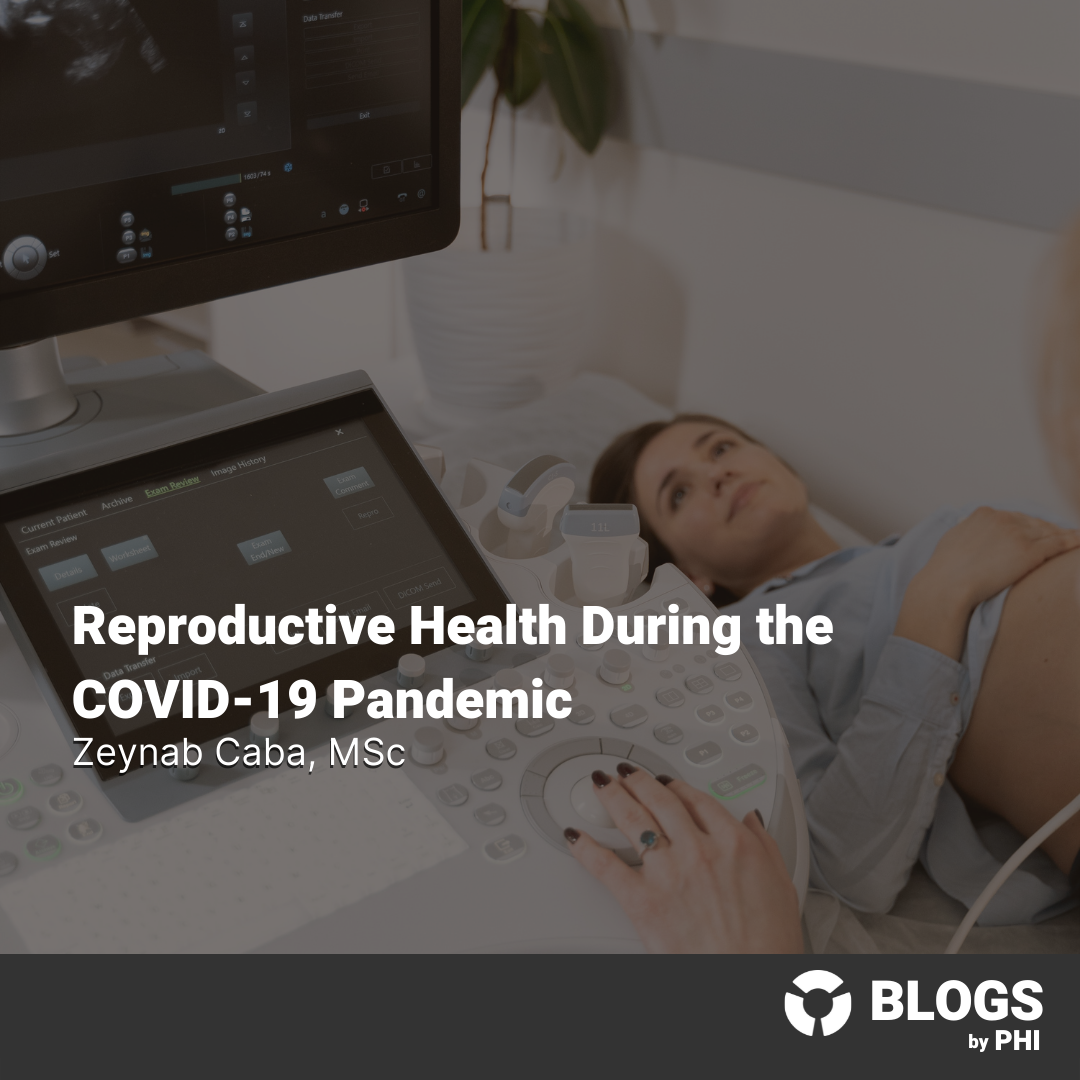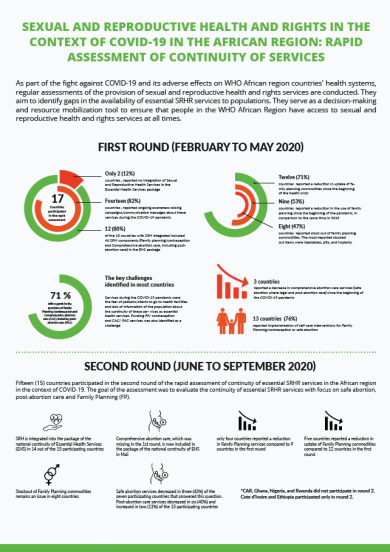
27/2/2022
Global responses to the COVID-19 pandemic have primarily focused on reducing and preventing direct infections from the virus. Meanwhile, the pandemic is having a profound impact on how people live their lives and how they access different health services. COVID-19 has been shown to affect people’s physical, mental, and social health (Lindberg et al., 2020). Mortality data on COVID-19 suggests severe health outcomes for men, however, there is increased concern that the disease disproportionately affects women socially and economically (Kotlar et al., 2021).
Despite this data, gaps still remain when considering the impact of COVID-19 on sexual and reproductive health (SRH). Poor SRH has wider impacts on peoples’ lives, including intergenerational effects and economic impacts (Mann et al., 2018). Therefore it’s necessary to further examine the global effects of the COVID-19 pandemic on sexual and reproductive health.
The COVID-19 pandemic has caused major disruptions to the supply chain for contraceptive products (Riley et al., 2020). Manufacturing of key pharmaceutical components to make contraceptives, as well as the methods for making contraceptives, have been disrupted and their transportation delayed (Riley et al., 2020). The COVID-19 pandemic response has led to disruptions to services and diversion of resources away from essential sexual and reproductive healthcare (Riley et al., 2020).
As seen in Figure 1, actions to mitigate the spread of SARS-CoV-2 infections meant reduced access to some SRH services and closed clinics, leading to increased risk of unsafe sexual practices and an increase in maternal and child morbidity and mortality (Burt et al., 2021). For example, the temporary closure of SRH services left many women without access to time-sensitive maternal and reproductive care, such as gynaecological check-ups, prenatal care, and abortions (Kotlar et al., 2021).
The UN Population Fund estimates that disruption to these services could potentially lead to 47 million women in low- and middle-income countries (LMICs) without use of modern contraceptives and 7 million women globally with unintended pregnancies (Kotlar et al., 2021). In countries like Nepal and India, national lockdowns forced non-governmental organisation (NGO) clinics like Marie Stopes International to either close or reduce their geographical reach (Riley et al., 2020). Facilities that remained open became overwhelmed, resulting in the clinics turning patients away due to lack of resources (Kotlar et al., 2021).

The pandemic has and continues to significantly impact maternal health. There has been a meaningful reduction in antenatal care services, with some clinics having offered antenatal care virtually and in the UK, some practices gave pregnant women urinalysis sticks and blood pressure machines to conduct their own antenatal care (Semaan et al., 2020). Alteration to prenatal care resulted in elevated levels of stress, depression, and anxiety in some women in the US (Preis et al., 2020), while social distancing and quarantine measures increased the feeling of loneliness in pregnant women and new mothers (Saccone et al., 2020). Studies on pregnant and postpartum women indicated that over 70% of women reported clinically significant levels of depression and anxiety and 40% were screened positive for PTSD (Kotlar et al., 2021).
Facilities in LMICs such as India resorted to turning ambulances and pregnant patients away from hospitals leaving women to give birth either at home or on the streets (Kotlar et al., 2021). Hospitals also limited the number of people per room and reduced the duration of patients’ stay to mitigate the demands, however, this has been shown to negatively impact access and quality of care (Kumari et al., 2020). In Nigeria, patients in early pregnancy were seen once in eight weeks as opposed to once in four weeks and antenatal care visits decreased by nearly a half (Kotlar et al., 2021).
Many patients were unable to attend antenatal visits due to lack of transportation, pressure to isolate and or fears about the virus. Dr Manala Makua, the Chief Director of Women’s health at the National Department of Health in South Africa, explains in the video below that social pressure and stigma plays a role in hindering access to care. Maternal healthcare providers worldwide are not trained to operate their clinics during COVID-19; healthcare providers reported not feeling knowledgeable enough to manage their maternal patients diagnosed with COVID-19, leading to poorer quality of care (Semaan et al., 2020).
In both the UK and Nepal, incidences of stillbirths and neonatal mortality were significantly higher during this pandemic when compared to pre-pandemic periods (Kc et al., 2020). Patients experiencing stillbirths and infant mortality did not show symptoms of COVID-19, indicating that these outcomes may be a result of the reduction in services and reallocation of resources (Kc et al., 2020).
The long-term impacts of COVID-19 on SRH are not yet clear, but studies suggest that it could have devastating impacts, especially for LMICs (Kotlar et al., 2021). In an episode of Everyday Emergency, healthcare providers explain the long term health impacts of reduced access to SRH services. Weaker health system and underfunded public health sectors means that LMICs may be ill-prepared to meet the demands of the pandemic and mitigate the damage of what lies ahead in regards to SRH services (Kc et al., 2020). These challenges can result in increasing the risk of physical, mental, and social health issues for pregnant and postpartum people (Hall et al., 2020).
Previous public health emergencies have shown that the impacts on SRH often go unnoticed, as the effects are not a direct result of infection. The disruptions to SRH highlight strained health systems and resources (Hall et al., 2020). Public health responses to the COVID-19 pandemic must continue to sufficiently prevent complex health and social harm for maternal health by allowing essential SRH services for all people.
We still have a lot to learn as we mitigate through this pandemic, in relation to the SARS-CoV-2 virus, wider health issues, and the longer-term impact from a decrease in essential SRH services for individuals and communities. Though this piece focused mainly on women and pregnant people’s reproductive health issues, it is important to note that reproductive health issues are not restricted to women. SRH encompasses everyone; the consequences of inadequate SRH affects us all.
Burt, J. F., Ouma, J., Lubyayi, L., Amone, A., Aol, L., Sekikubo, M., Nakimuli, A., Nakabembe, E., Mboizi, R., Musoke, P., Kyohere, M., Lugolobi, E. N., Khalil, A., & Doare, K. L. (2021). Indirect effects of COVID-19 on maternal, neonatal, child, sexual and reproductive health services in Kampala, Uganda. BMJ Global Health, 6(8), e006102. https://doi.org/10.1136/bmjgh-2021-006102
Hall, K. S., Samari, G., Garbers, S., Casey, S. E., Diallo, D. D., Orcutt, M., Moresky, R. T., Martinez, M. E., & McGovern, T. (2020). Centring sexual and reproductive health and justice in the global COVID-19 response. Lancet (London, England), 395(10231), 1175–1177. https://doi.org/10.1016/S0140-6736(20)30801-1
Kc, A., Gurung, R., Kinney, M. V., Sunny, A. K., Moinuddin, M., Basnet, O., Paudel, P., Bhattarai, P., Subedi, K., Shrestha, M. P., Lawn, J. E., & Målqvist, M. (2020). Effect of the COVID-19 pandemic response on intrapartum care, stillbirth, and neonatal mortality outcomes in Nepal: A prospective observational study. The Lancet Global Health, 8(10), e1273–e1281. https://doi.org/10.1016/S2214-109X(20)30345-4
Kotlar, B., Gerson, E., Petrillo, S., Langer, A., & Tiemeier, H. (2021). The impact of the COVID-19 pandemic on maternal and perinatal health: A scoping review. Reproductive Health, 18(1), 10. https://doi.org/10.1186/s12978-021-01070-6
Kumari, V., Mehta, K., & Choudhary, R. (2020). COVID-19 outbreak and decreased hospitalisation of pregnant women in labour. The Lancet Global Health, 8(9), e1116–e1117. https://doi.org/10.1016/S2214-109X(20)30319-3
Lindberg, L. D., Bell, D. L., & Kantor, L. M. (2020). The Sexual and Reproductive Health of Adolescents and Young Adults During the COVID-19 Pandemic. Perspectives on Sexual and Reproductive Health, 52(2), 75–79. https://doi.org/10.1363/psrh.12151
Mann, S., & Stephenson, J. (2018). Reproductive health and wellbeing. 11.
Preis, H., Mahaffey, B., Heiselman, C., & Lobel, M. (2020). Pandemic-related pregnancy stress and anxiety among women pregnant during the coronavirus disease 2019 pandemic. American Journal of Obstetrics & Gynecology Mfm, 2(3), 100155. https://doi.org/10.1016/j.ajogmf.2020.100155
Riley, T., Sully, E., Ahmed, Z., & Biddlecom, A. (2020). Estimates of the Potential Impact of the COVID-19 Pandemic on Sexual and Reproductive Health In Low- and Middle-Income Countries. International Perspectives on Sexual and Reproductive Health, 46, 73–76. https://doi.org/10.1363/46e9020
Saccone, G., Florio, A., Aiello, F., Venturella, R., De Angelis, M. C., Locci, M., Bifulco, G., Zullo, F., & Di Spiezio Sardo, A. (2020). Psychological impact of coronavirus disease 2019 in pregnant women. American Journal of Obstetrics and Gynecology, 223(2), 293–295. https://doi.org/10.1016/j.ajog.2020.05.003
Semaan, A., Audet, C., Huysmans, E., Afolabi, B., Assarag, B., Banke-Thomas, A., Blencowe, H., Caluwaerts, S., Campbell, O. M. R., Cavallaro, F. L., Chavane, L., Day, L. T., Delamou, A., Delvaux, T., Graham, W. J., Gon, G., Kascak, P., Matsui, M., Moxon, S., … Benova, L. (2020). Voices from the frontline: Findings from a thematic analysis of a rapid online global survey of maternal and newborn health professionals facing the COVID-19 pandemic. BMJ Global Health, 5(6), e002967. https://doi.org/10.1136/bmjgh-2020-002967